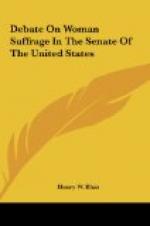to the Constitution, because I think they are unnecessary,
but because you say there is not in the Constitution
enough to protect me. Therefore I ask that
you, true to your own theory and assertion, should
go forward to make more constitution.
Let me remind you that in the case of all other classes of citizens under the shadow of our flag you have been true to the theory that taxation and representation are inseparable. Indians not taxed are not counted in the basis of representation, and are not allowed to vote; but the minute that your Indians are counted in the basis of representation and are allowed to vote they are taxed; never before. In my State of New York, and in nearly all the States, the members of the State militia, hundreds and thousands of men, are exempted from taxation on property; in my State to the value of $800, and in most of the States to a value in that neighborhood. While such a member of the militia lives, receives his salary, and is able to earn money, he is exempted; but when he dies the assessor puts his widow’s name down upon the assessor’s list, and the tax-collector never fails to call upon the widow and make her pay the full tax upon her property. In most of the States clergymen are exempted. In my State of New York they are exempted on property to the value of $1,500. As long as the clergyman lives and receives his fat salary, or his lean one, as the case may be, he is exempted on that amount of property; but when the breath leaves the body of the clergyman, and the widow is left without any income, or without any means of support, the State comes in and taxes the widow.
So it is with regard to all black men. In the State of New York up to the day of the passage of the fifteenth amendment, black men who were willing to remain without reporting themselves worth as much as $250, and thereby to remain without exercising the right to vote, never had their names put on the assessor’s list; they were passed by, while, if the poorest colored woman owned 50 feet of real estate, a little cabin anywhere, that colored woman’s name was always on the assessor’s list, and she was compelled to pay her tax. While Frederick Douglas lived in my State he was never allowed to vote until he could show himself worth the requisite $250; and when he did vote in New York, he voted not because he was a man, not because he was a citizen of the United States, nor yet because he was a citizen of the State, but simply because he was worth the requisite amount of money. In Connecticut both black men and black women were exempted from taxation prior to the adoption of the fifteenth amendment.
The law was amended in 1848, by which black men were thus exempted, and black women followed the same rule in that State. That, I believe, is the only State where black women were exempted from taxation under the law. When the fourteenth and fifteenth amendments were attached




